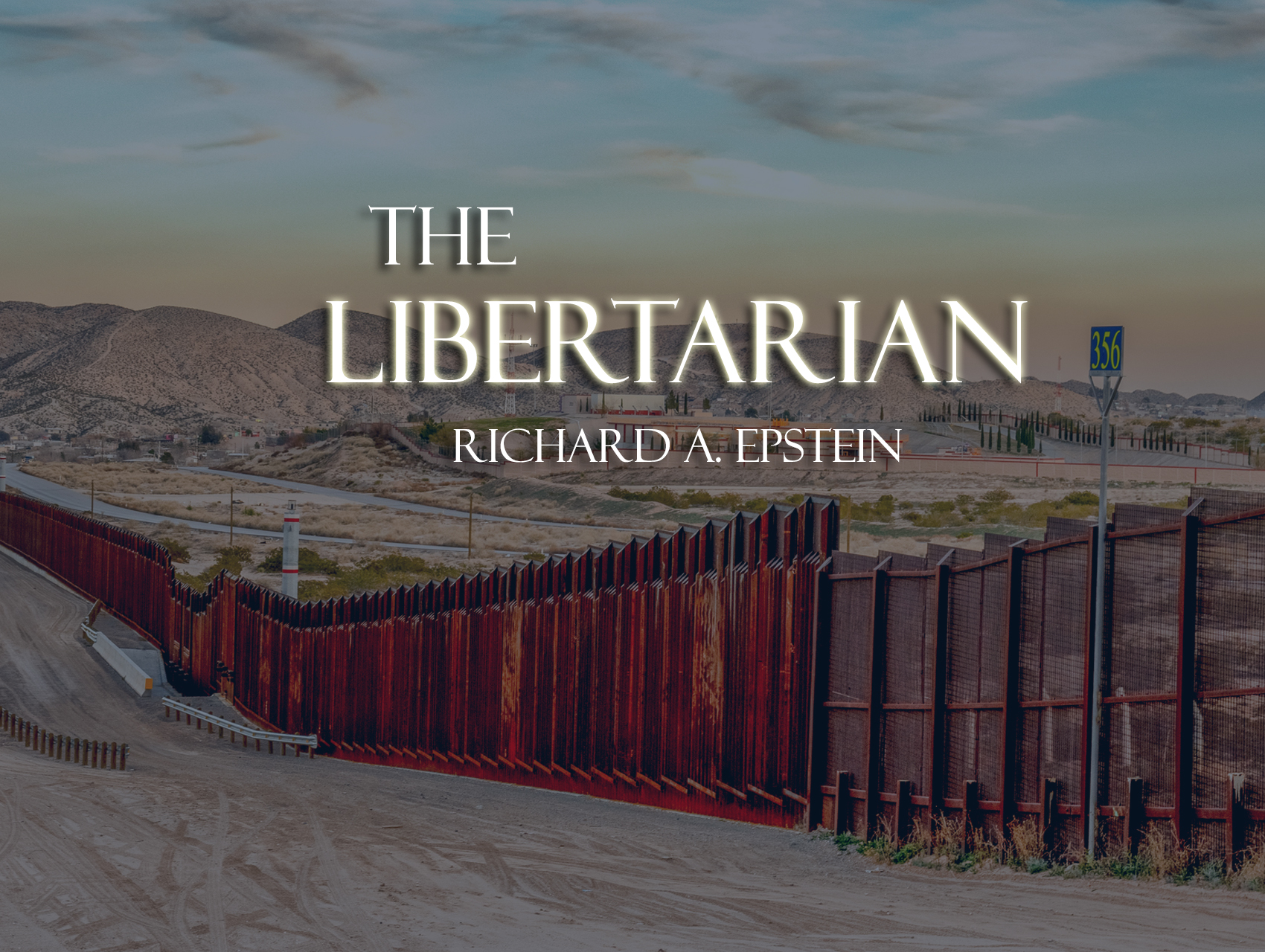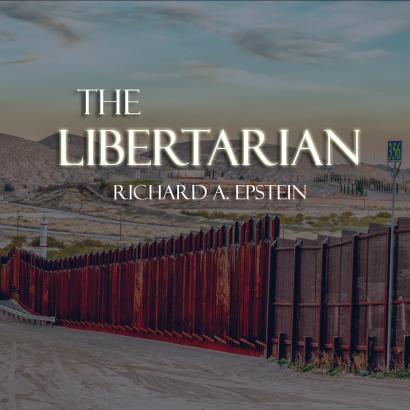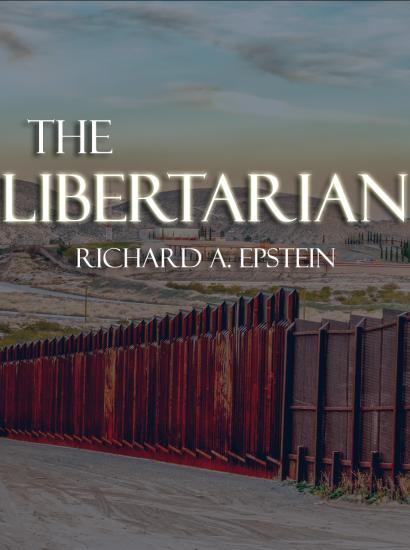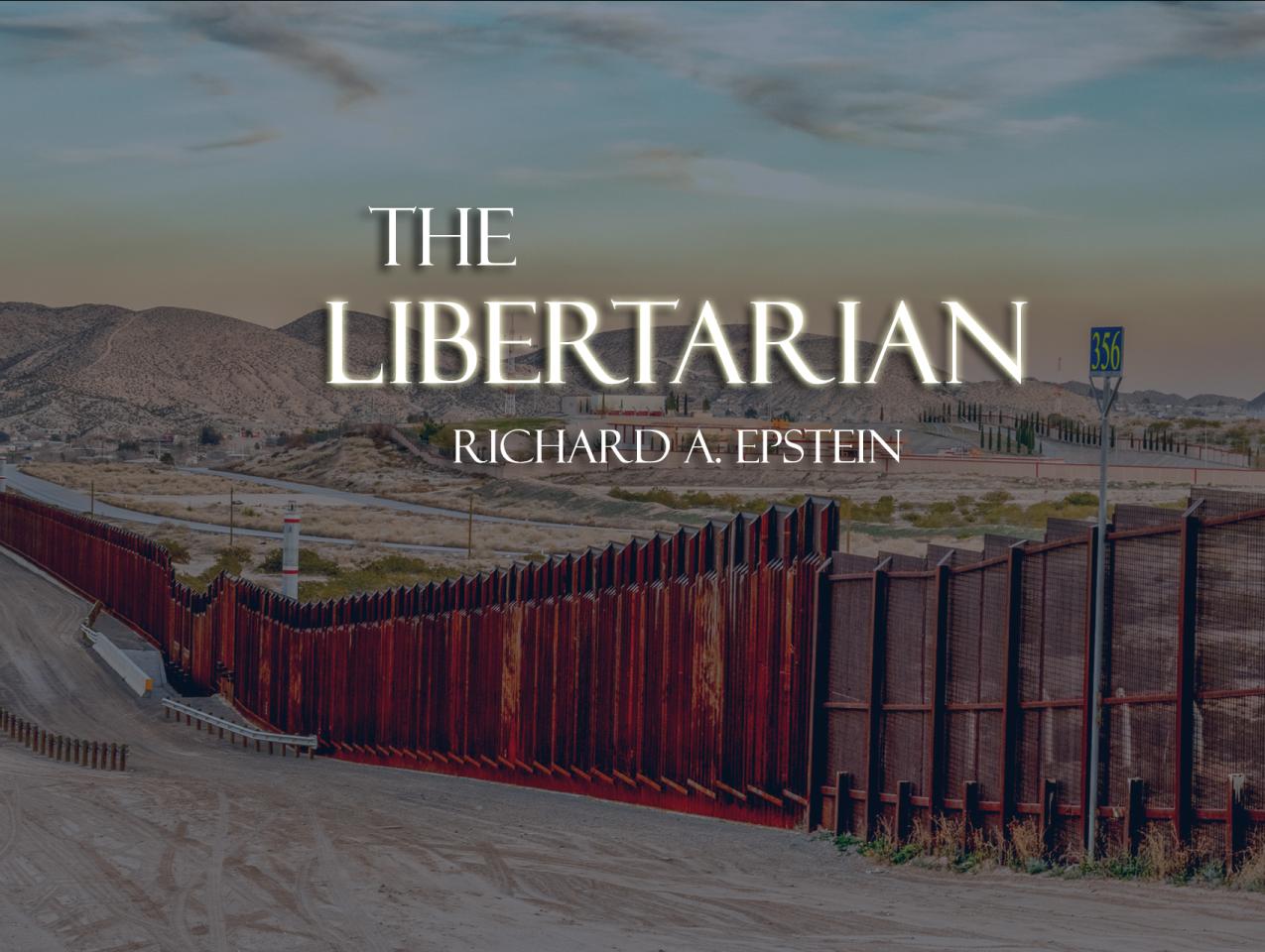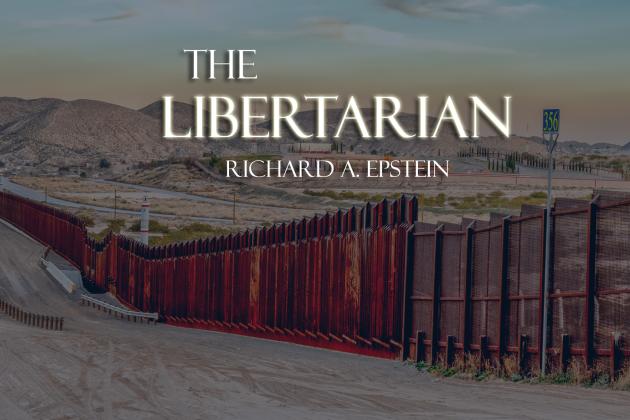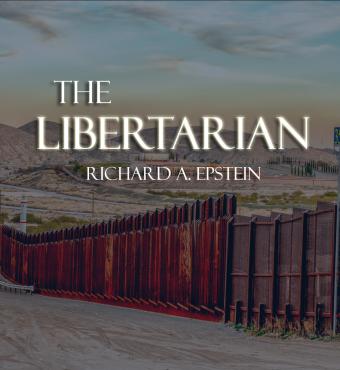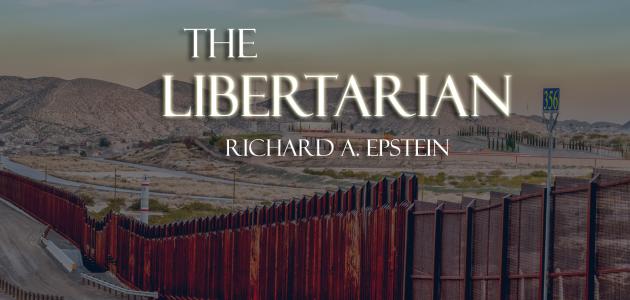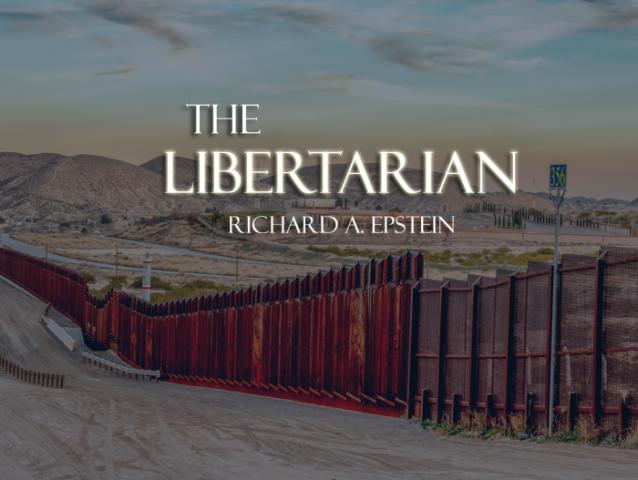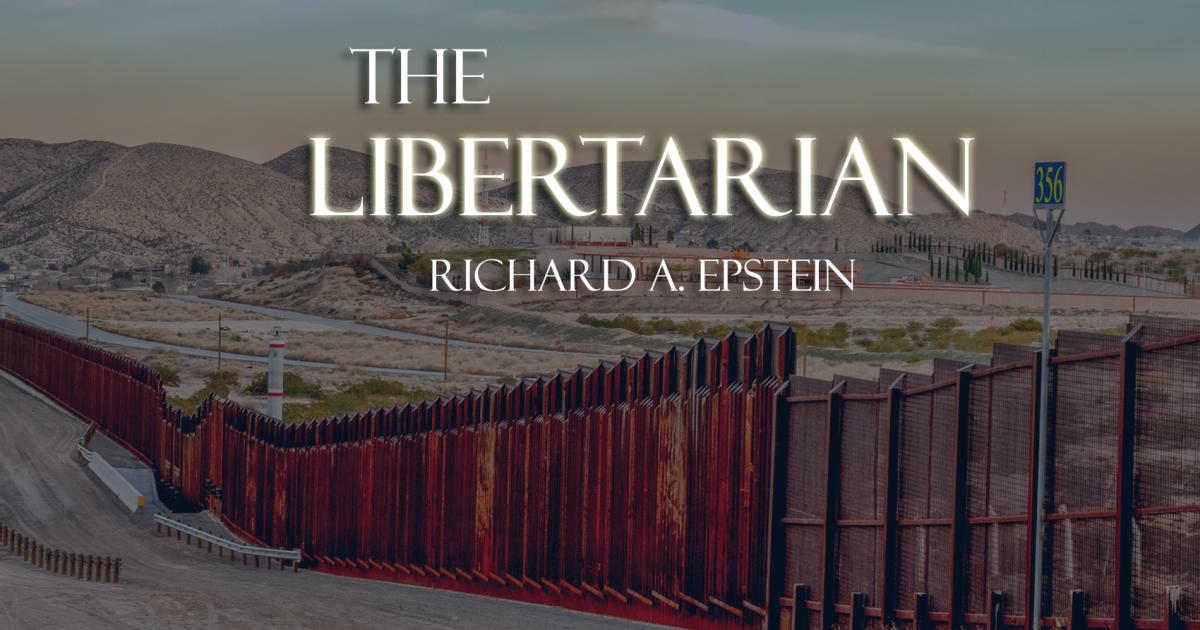Richard Epstein untangles the various legal challenges to Title 42 and its pandemic-motivated border control policy, and speculates as to why the Biden administration hasn’t ended it on its own.
>> Tom Church: This is the Libertarian Podcast from the Hoover Institution. I'm your host, Tom Church, and I'm joined by the libertarian himself, professor Richard Epstein. Richard is the Peter and Kirsten Bedford senior fellow here at the Hoover Institution. He is the Lawrence A Tisch professor of law at NYU and is a senior lecturer at the University of Chicago.
Now Richard, we have a legal journey to discuss, because today, I'd like to talk to you about title 42. It's a federal law used originally by the Trump administration and now the Biden administration to prohibit migrants at the Canadian and Mexican borders from entering the country. And we're talking about a lot of people, it's 2.4 million expulsions since March 2020.
And believe it or not, Richard, 400,000 were under Trump and 2 million have been so far under president Biden. Now earlier last year, which, happy new year, by the way, Richard.
>> Richard Epstein: And happy new year to you.
>> Tom Church: Thank you, the Biden administration decided to end its use of title 42, only to be blocked by a conservative judge at the district court level, which said that the administration hadn't followed the proper procedures to wind it down.
Now in November, a different district court judge ruled that the continued use of title 42 was no longer justified in light of the state of the pandemic. However, the judge stayed its own order to give time to the Biden administration to prepare. Then, 19 GOP states brought suit to, I guess, stop the title 42 from being stopped again, only to be blocked by DC district court judge for lacking standing.
Okay, now at this point, Supreme Court has had to step in, and we've got a case called Arizona versus Mallorcas, which recently, 27 December, granted a stay of the petition by the states until the case could be argued in late February to figure out if states had standing.
Now this is a lot going on, Richard, I need you to walk me through this. Who is ultimately going to decide if title 42, as it's being used right now, is legal or illegal?
>> Richard Epstein: Well, I think the answer is we don't know until a, we resolve the standing question, and b, we resolve the merits question, when the standing question is resolved.
But it starts on the sort of the basic situation, it's been well established for the last six, well, almost 100 years now. That immigration policy falls within the exclusive domain of the federal government, and states have very limited powers in which to alter to change that. This is something of a constitutional stretch, I might add, because immigration is not what is given as one of the enumerated federal powers.
And naturalization is put into that category, and naturalization is simply the conversion of somebody who's an alien to somebody who now has citizen status. And so the Supreme Court and the federal government managed to get a jurisdiction over this into the Congress by a series of judicial decisions, none of which are particularly rigorous, all which are now completely dispositive of their power to have it.
So ultimately, as this order says, Congress can fix this thing any way in which it wants. And it's gonna be very difficult to find either a state or an individual who could give either a structural or an individual rights argument in order to stop that particular outcome. What the states are trying to do is to say, we have standing.
And the explanation for why they have standing is, if you do not essentially stop this inundation, our social facilities are going to be completely overwhelmed. And if they're completely overwhelmed, it's clear that we have an interest in making sure that we can reduce that flow, so we should be allowed.
There is a precedent just occurred to me, actually called Massachusetts against the EPA, which had to do with the whole question as to whether or not carbon dioxide counts as a pollutant under the Clean Air act, which was eventually decided, yes. But before that, there was the question as to whether or not the state, Massachusetts in that instance, had standing.
And the argument was, well, of course it has standing with respect to this federal policy. Because what you do with respect to the environment is going to influence whether or not our beaches stay together or whether they crumble. And so we have essentially a proprietary environmental interest in this case.
That argument is not, however, a complete answer to the issue here, because the issue with respect to the immigration is slightly different form. The earlier cases tended to treat this as though it was exclusively a federal matter. So even though they would have standing to argue this, and I think they probably would, under EPA in Massachusetts, they're not gonna be able to win.
Well, then what's the Biden administration going to do? And I think they are basically in a genuine quandary. They understand full well that the policy of opening up the borders is not sustainable today, given the pattern in which the entries start to take place. One just has to simply look at all the buses shuttling back and forth from the southern border to places like Florida and Nantucket and so forth.
To realize that the capacity of the various states, to house immigrants in a decent and humane fashion, simply doesn't exist. And so what the Biden administration would kind of like to do is to have its hands tied. And this then leads to the following oddity, which is 42 is essentially an anti-disease, anti-COVID statute.
You could keep them out because they have COVID. Question, does that apply if COVID is, quote unquote, no longer an epidemic? The answer is, well, it still applies if individuals can have COVID and we have to screen them, then it turns out you screen them and they discern that they don't have COVID.
How can you keep them out anyhow? On the grounds that they might get COVID, at which point it all becomes a farce. But the underlying question is, I think, the much deeper one is the United States gonna be in a position to protect its borders? And there are people who are open immigration advocates who don't want that to be the case, we're quite happy about this.
And then there are other people who are absolutely in a panic about it, but they don't quite know how to stop the Biden administration from moving forward. Because they think what the Biden administration wants to do is to get as many people into the country, grant them amnesties, then have them become future democrats, which will allow them to perpetuate the hold on American policy.
And so there are layers within layers on this particular case. And I cannot say at this moment on January 5th, that it will end and they lived happily ever after.
>> Tom Church: I got to follow up on something here, because the recent ruling by the Supreme Court specifically said, and I'll quote, it doesn't prevent the federal government from taking any action with respect to the policy, meaning title 42 of the interpretation.
The review is, quote, only limited to the question of intervention and, quote, by the states. So does the Biden administration actually want to stop its use of title 42? What is stopping it from doing it on its own? Does it do that before the case even is argued?
>> Richard Epstein: I don't think they want to stop. I think what happens is, they wanna be compelled to keep it alive. This is the alternative, they say, we're gonna stop this particular stuff cuz we don't like it. They run a danger of antagonizing their progressive lab. And remember, they've already got themselves in a little bit of trouble on this with the railway accommodation that was jammed down the union's throat.
The unions were forced to go without the sick benefits. And lots of progressives say, wait, you talk about being the most pro labor president ever, and you've done something which is essentially a Judas like act and you've committed treason against them. I don't think they want to do the same thing again and to come forward and having to say, we really think this open border stuff is a big mistake.
And we're gonna go back to more traditional policies like Mr. Trump and maybe even Mr. Obama beforehand. I don't think they wanna do that. And so I think what they wanna do is they wanna be compelled to do it. Now note, what's gonna happen is if the Supreme Court in February, decides that the states do have standing to stop this thing, which is, I think, a very iffy proposition.
Both ways, I might add. Then, you're gonna have to brief the thing, and somebody's gonna say, well, let's keep this policy in place for another four months until we can get the oral argument. We may be able to get it in this term. It could even be hauled over to the next term.
And my guess is what the Biden administration will do is slow walk the situation, saying it's okay to preserve the status quo, on an interim basis. And then hopefully the problem will start to abate to go away in some way. So they're not gonna have to face the real ugliness of a major decision, down the road.
That's my guess as to what is going on in this case. I think they box themselves into a position where rhetorically, they have to face something which looks much more like an open border. But seeing the chaos that's coming everywhere inside the United States, it turns out letting immigrants in the form that we do here.
Is a lot more difficult than it was when we decided to have a, quote, unquote, much more open immigration policy, back in 1907. Indeed, in the whole period between about 1890 and 1920, we did have a policy, which was called open immigration, but it is very different from the one that we have in place now.
>> Tom Church: To your point, Richard, about the Biden administration sort of, I guess, wanting this policy or wanting to be handcuffed. Just today, they expanded the number of home countries that migrants could be expelled from to Cuba, Haiti, Nicaragua, and Venezuela. So right now, it's not that all migrants caught at the border can be expelled.
It's only certain home countries. So, I mean, they're expanding the use while perhaps arguing, this isn't, this isn't right.
>> Richard Epstein: What they can do is they can put everybody on that list. I mean, as far as I can see, the Trump people did this as a kind of a bona fide, a health care accommodation.
Saying it's much easier for us to handle this situation by supporting relatively humane conditions in Mexico rather than letting them in here, and then having a situation of having them escape. Nobody's gonna try to escape from a Mexican facility to go into Mexico. They don't need to do that.
But they will try to escape from an American facility that is a detention home, if they think that they could find a place to live in the United States, that's gonna allow them to be relatively protected. So, all of this stuff is just completely different from what is there.
And the Biden administration doesn't want to take the Trump positions publicly. Now, remember this, if the states have standing, and I kinda believe that, sure, they have standing. It's not to say that they have a case on the merits, but then you have to brief the case on the merits and argue it.
You get yourself maybe four months, probably as much as six or eight or ten months, in which to try to work this thing out. And I don't know whether they're gonna be able to do it. It's a sufficiently messy situation, that it becomes perfectly clear, that opening up the gates tomorrow, will simply swap all the internal facility.
There won't be enough buses to enough places, to basically ease that pain. And you're gonna see people kept in really wretched situations, which is not something you want. The hope of a stronger, anti-trim, anti-immigration policy, is that will happen. People will no longer congregate at the border because they no longer think they have any chance of getting in.
So you're not gonna face that kind of huge influx of. That's I think is what the long-term logic is being. But it's very difficult for the Biden administration to announce that they're in support of that position.
>> Tom Church: So you sound pretty iffy on, whether states have the ability to.
>> Richard Epstein: I'm very iffy on everything.
>> Tom Church: Well, sure. Well, you're not, I don't think that's true, Richard. You're quite certain about some things. But I want to go to the Supreme Court, come on. Justice Gorsuch sided with the three liberal justices on the recent ruling. So, I mean, are we looking to late February arguments and do you think, okay, this falls easily on the conservative side or liberal side?
What do you see happening?
>> Richard Epstein: Well, I mean, state standing, as I said, is controversial. In the EPA cases with respect to carbon dioxide, they granted the state standing and then they allowed them to win. In this particular case they may say, sure, you have a very large stake at it, but the structure of immigration policies in the case, called Hind and Davidovits around 1941.
Has always been to say that the federal government has a whip hand on this. And the only ways that the states can get themselves involved in this particular policy is if they're given an explicit blessing by the United States government, that they are now allowed to participate in one way, shape or form.
Biden doesn't wanna do that. I mean, he is very upset about the prospect of shutting down the policy formally, and yet he's frightened to death about having the borders continue to be open. That's why we have this. So I think the immigration, the governments, if I were them, I would want the Republican attorney generals to win on the standing question.
Cuz that would just prolong the period, in which they have a chance to work out a political solution.
>> Tom Church: Can I ask, Richard, this is on the other side. There's some irony, isn't there, that the GOP states, many of the ones suing to get standing to keep title 42 in place.
Are also the ones that are arguing against President Biden's student loan forgiveness on the grounds that the pandemic isn't around anymore. And so the health justification, doesn't matter. But now they're saying, title four issue should stay because, and the justification is literally because of a health pandemic, illness coming from other countries.
What do we make of that?
>> Richard Epstein: Let's make about that politics leads to a certain degree of intellectual opportunism, and that intellectual opportunism is not a political vice that is only red or blue. It turns out that both parties turn out to have the very same incentives to start to do it.
I think the big difference between the two cases is that there was no reason whatsoever for the Biden administration to go forward with this massive effort in student loan forgiveness. There's so many arguments against doing it on the merits, including to make a mockery of everybody who's paid off their bill.
They're not gonna have to pay everybody else's bill off as well, whereas people who have delayed and essentially have tried to evade their obligations are now gonna be rewarded for their skullduggery. So, I think that that's a manufactured crisis for political reasons. My view about it is Biden having, I think, gotten a fair bit of mileage out of that in the last election in 2022, isn't gonna be terribly upset if the program gets struck down.
But the immigration problem is not that kind of a government made crisis. This is the most serious issue that we face in the United States, about how it is that we control our borders and how it is that we act in a relatively humane tradition. Or fashion with respect to those people we're trying to get in.
That's a serious problem. And so, I think in effect that, one could basically look at what Biden said in the student loan context and blow it off. This is obviously a complete fabrication. We don't have to worry about it. The problem about blowing off 42, is you then have unless something else is done, massive immigration at the borders of illegal aliens for which we have no particularly effective way to deal.
And that's a much larger problem. So, I think in effect that when the Biden administration wants to keep the COVID crisis alive, in order to stem the immigration situation. I'm more inclined to turn them a blind eye, particularly since, you never know that it's over. This thing always goes in waves.
We know there's a big new wave in China now. We're also perfectly confident that no matter how many quarantines you put, no matter how many inspections you run on buses. That this thing will make it into the United States, will make it into Latin America in some form, we hope it's not gonna be particularly malicious or dangerous or deadly, but it's gonna be there.
So, one could say, COVID is forever. So long as we have health policies like the Chinese, where either they try to have hopeless embargoes on the one hand, or wildly unrestricted access to public spaces on the other hand. So long as you got the Chinese there, there's always a risk that the COVID thing is going to start to reemerge.
And I think that you could at least say, we have to keep this thing in place. But what's gonna happen is you still have the same answer. You're not using this to deal with COVID today. If you need to deal with it, probably, tomorrow you could revise it.
What you're doing today is simply using it as a block against immigration. And so therefore, what we ought to be able to do is to prevent you from having this happen. It's a kind of a catch 22, there's got to be some way to describe this terrible type of situation that's going on.
But as I said, the one thing that's clear is everybody seems to gain from the delay of having a formal resolution of this problem, which is why I think that the standing issue is manna from heaven. And then we'll see which way they come on it. I can't believe that they will sustain the policy, given the applicable precedents.
But I've been wrong so many times before that when it comes to predicting the way in which the Supreme Court will behave. It's as much a political body against its own will as it is a judicial or jurisprudential body. And so, therefore, the range of possibilities that become credible always gets larger as the political dimension becomes more salient.
>> Tom Church: Richard, let's end on this issue of immigration. Many of the people coming across the border are claiming asylum, and there just aren't enough, well, spots that we grant for asylum. And so while we're left with tens of thousands a month at this point who are staying legally or being expelled.
So how can we change the asylum system in order to diminish this incentive for mass immigration?
>> Richard Epstein: The only thing you can do is to be extremely tough and to say to people, if you come to the border, you're automatically going to be told back. And what you have to do in order to make that work is to make sure that everybody does not have a potential claim for refugee status on the grounds that they've been subject to a series of hard knocks in the political arena.
What's happened is, under the Republican administration, when they started to talk about political refugees, the kinds of people they were thinking about. Where people would been subject to prosecution or arrest in their own countries and had to get out. Or they would face the same punishment, and perhaps, even death if they stayed.
Now, the refugee claim is, economic circumstances are very bad in Honduras. And so, we are constantly subject to famine and starvation, the risk of criminal behavior by private individuals. And if that's the only thing you need to establish some refugee status, everybody has got it, because the whole country, essentially, is subject to those kinds of pressure.
So the narrower definition gets you out of all that stuff. And it's exactly that definition that the defendants have fought. The Democrats have fought for a very long period of time, so they have to make a change in policy. And I don't think they're particularly eager to do that, because they're gonna have to face the gotcha moment from the Republicans who say, look, we told you all the time that you could never stop to do this sort of thing.
So what I think is likely to happen is that this is going to continue to be a muddle for as long as possible, and that what will then happen is that the Biden administration will move to keep immigrants out, refugees out. When they don't think it involves states for which there are large domestic populations who might support the removal of the ban and letting people in.
And then what they will do is they will just continue to do this kind of aimless wandering around legally in the hope that something will disappear. This is a case in which you try to kick the can down the road in the hope that by the time that it actually comes to the point where you have to solve it, the problem itself will have disappeared or been reduced to manageable proportions.
>> Tom Church: You've been listening to The Libertarian podcast with Richard Epstein. Make sure to read Richard's weekly column, The Libertarian, published on Defining Ideas at hoover.org. If you found our conversation thought provoking, please share it with your friends, and rate the show on Apple podcasts or wherever you're tuning in.
For Richard Epstein, I'm Tom Church, we'll talk to you next time.
>> Speaker 3: This podcast is a production of the Hoover Institution, where we advance ideas that define a free society and improve the human condition. For more information about our work, or to listen to more of our podcast or watch our videos, please visit hoover.org.







